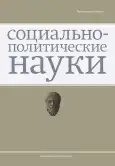Russian Gas Import in the Germany Socio-Political Discourse
- Authors: Katalkina N.A.1, Bogdanova N.V1
-
Affiliations:
- Peter the Great State Polytechnic University
- Issue: Vol 12, No 3 (2022)
- Pages: 98-104
- Section: Articles
- URL: https://journal-vniispk.ru/2223-0092/article/view/146978
- DOI: https://doi.org/10.33693/2223-0092-2022-12-3-98-104
- ID: 146978
Cite item
Abstract
Full Text
##article.viewOnOriginalSite##About the authors
Natalija A. Katalkina
Peter the Great State Polytechnic University
Email: nat-vassiljeva@yandex.ru
Cand. Sci. (Philol.); associate professor at the International Relations Higher School St. Petersburg, Russian Federation
N. V Bogdanova
Peter the Great State Polytechnic University
Email: nvbogdanova.imop@mail.ru
PhD in Pedagogy; associate professor at the International Relations Higher School St. Petersburg, Russian Federation
References
- International statistics. URL: https://rosstat.gov.ru/incomparisons (date of access: 21.01.2022).
- Shuvalova O.V. Regional aspects of the modern energetic policy in Germany. Proceedings of the Russian Academy of Sciences. Geographic series. 2007. Issue 5. Pp. 37-44. (In Rus.)
- Zaritskiy B.E. Modern problems of Russia-Germany relations. World and National Economy. 2016. No. 3 (38). (In Rus.). URL: https://mirec.mgimo.ru/upload/ ckeditor/files/mirec-2016-3-zaritskiy.pdf (date of access: 24.01.2022).
- Mogilnikova M.V. The history of German-Russian gas relations: The correlation of politics and energy. Bulletin of ZabGU. 2016. Vol. 22. No. 8. Pp. 62-71. (In Rus.)
- Perekhod E. Historical aspects of gas cooperation of Russia and Germany. Geoeconomics of Energy. 2018. No. 4. Pp. 138-149. (In Rus.)
- Meden N.K. Oil and gas from Russia: German views of energy security. Russia and the Modern World. 2009. No. 2 (63). Pp. 34-49. (In Rus.)
- Lenzen R. Die Energiesicherheit der Bundesrepublik Deutschland. Eine Analyse der Abhängigkeit von russischem Gas und der relativen Verfügbarkeit von Alternativen // AIPA. 2018. Nr. 1. 90 S. URL: https://ib.uni-koeln.de/sites/jaeger/publikationen/aipa/ AIPA_2018_1.pdf (data of accesses: 21.02.2022).
- Rahr A. Kein Europa ohne Rußland // Internationale Politik. 2009. Nr. 1. S. 45-50. URL: https://internationalepolitik.de/de/kein-europa-ohne-russland (data of accesses: 15.02.2022).
- Ivanov A.S., Matveev I.E. World energy at the turn of 2011-2012: Arrhythmia of development and deepening disproportions in the market structure. Russian Foreign Economic Bulletin. 2012. No. 10. Pp. 11-32. (In Rus.)
- Ivanov A.S., Matveev I.E. Modern landscape of world energy: Sharpening of contrasts. Russian Foreign Economic Bulletin. 2013. No. 12. Pp. 16-44. (In Rus.)
- Ivanov A.S., Matveev I.E. Global energy at the turn of 2016: The struggle for resources, increased competition. Russian Foreign Economic Bulletin. 2016. No. 1. Pp. 16-41. (In Rus.)
- Ivanov A.S., Matveev I.E. World energy market in the interweaving of geopolitical realities on the threshold of 2017. Russian Foreign Economic Bulletin. 2017. No. 1. Pp. 17-31. (In Rus.)
- Khodov I.L. Gas is an important component of economic relations between Russia and Germany. Bulletin of the Moscow State Open University. 2010. No. 2. Pp. 28-32. (In Rus.)
- Basedau M., Schultze K. Abhängigkeit von Energieimporten. Risiko für Deutschland und Europa? // GIGA Focus. 2014. Nr. 8. URL: https://www.giga-hamburg.de/en/publications/giga-focus/abhaengigkeit-von-energieimporten-risiko-fuer-deutschland-und-europa (data of accesses: 10.02.2022).
- Andreeva E.L., Ratner A.V., Sobolev A.O. Impact of renewable energy development in Germany on Russian energy export. Modern Europe. 2021. No. 4 (104). Pp. 71-82. (In Rus.)
- Russell M. Energieversorgungssicherheit in der Außenpolitik der EU // EPRS / Wissenschaftlicher Dienst des Europäischen Parlaments. 2020. 28 S.
- Basov F.A. Energy and environmental cooperation between Russia and Germany. World Economy and International Relations. 2011. No. 8. Pp. 101-109. (In Rus.)
- Kalashnikov A.M. Significance of the Nord Stream project implementation for the Russian Federation. Clio. 2012. No. 1 (61). Pp. 71-75. (In Rus.)
- Dubrovina А.S. “Nord Stream” a long-term perspective of economic cooperation between Russia and the European Union. News of the Irkutsk State University. 2013. No. 1 (10). Pp. 20-26. (In Rus.)
- Borovsky Y.V. The Soviet and Russian energy Industry as objects of western sanctions: Political rivalry or economic competition. Bulletin of MGIMO-University. 2019. No. 3 (66). Pp. 42-60. (In Rus.)
Supplementary files








